The Fund’s efforts towards the economic sustainability of peace signatories
“Laying the foundations for the construction of a stable and lasting peace requires the effective reintegration of the FARC-EP into the social, economic, and political life of the country. The reintegration process reaffirms the FARC-EP’s commitment to contributing to the end of the armed conflict, becoming a legal political actor, and decisively supporting the consolidation of national reconciliation, peaceful coexistence, non-repetition, and the transformation of the conditions that have enabled the origin and persistence of violence in the national territory.” AP 3.2
Given that the reintegration of signatories is a cornerstone of the Peace Agreement, the Multi-Partner Fund has, since its inception, worked towards the socio-economic and political reintegration of the peace signatories. Since then, the Fund has technically and financially backed 120 collective projects and 1,238 individual projects that have impacted 9,846 (72%) of the peace signatories.
Over a period of six years, in a process that was new to Colombia, and through a partnership between the United Nations System – UNDP, IOM, and FAO – and the Agency for Reintegration and Normalisation (ARN), a joint initiative was designed and implemented to provide the signatories with the means to carry out their life projects — representing the first approach to income-generating schemes during the early years of their reintegration into civilian life.
This contribution included not only the financial closures (the resources required to make the production projects approved by the National Reintegration Council viable), but it also provided technical strengthening of their associative forms through the management and administration of resources. It created opportunities for vocational training, enabling them to explore income-generating options and secure their socioeconomic inclusion, and it also supported those signatories who chose to pursue individual ventures.
[1] Es una instancia creada por el Acuerdo Final de Paz, cuyo objetivo es definir las actividades, establecer el cronograma y adelantar el seguimiento del proceso de reincorporación a la vida civil de los ex-miembros de las Farc-EP. Ver mas en : https://www.reincorporacion.gov.co/es/reincorporacion/Paginas/Consejo-Nacional-de-Reincorporacion.aspx
Phase I
Reintegration in production settings and socioeconomic integrationLaying the foundations for a socioeconomic offering that favours sustainable reintegration, through financial closures and technical assistance.
Promoting the participation of the local communities.
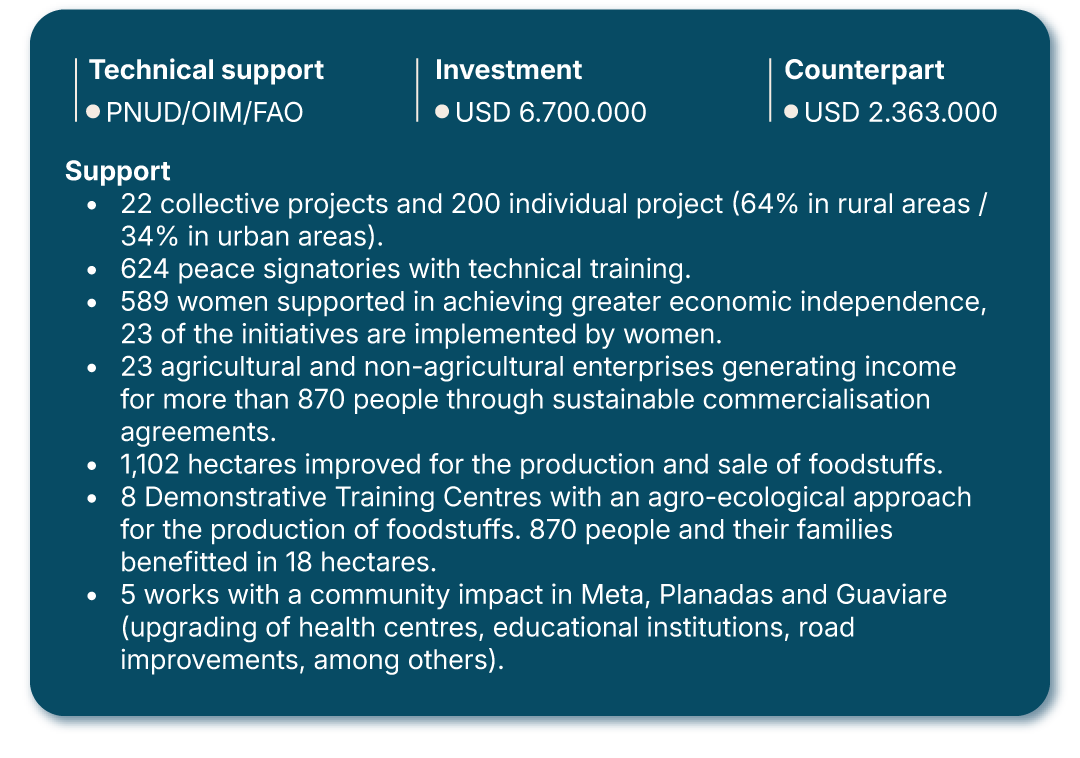
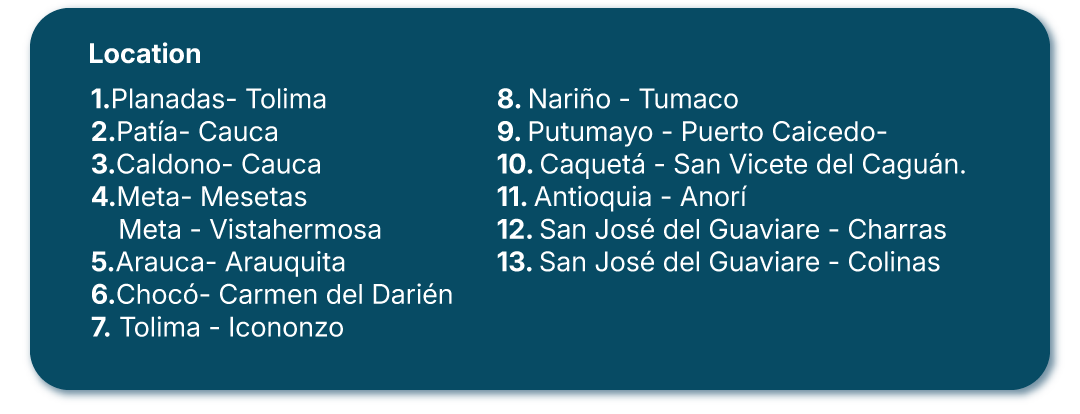
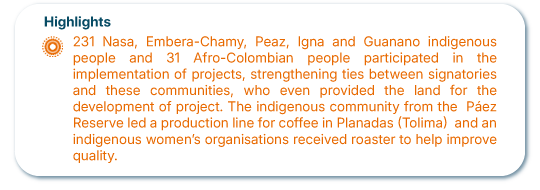
Phase II
Peace Settings, Reconciliation and Care ModelAccelerating the process of economic and community reintegration, increasing technical capacities and promoting sustainable production alternatives for the generation of income. generación de ingresos de firmantes
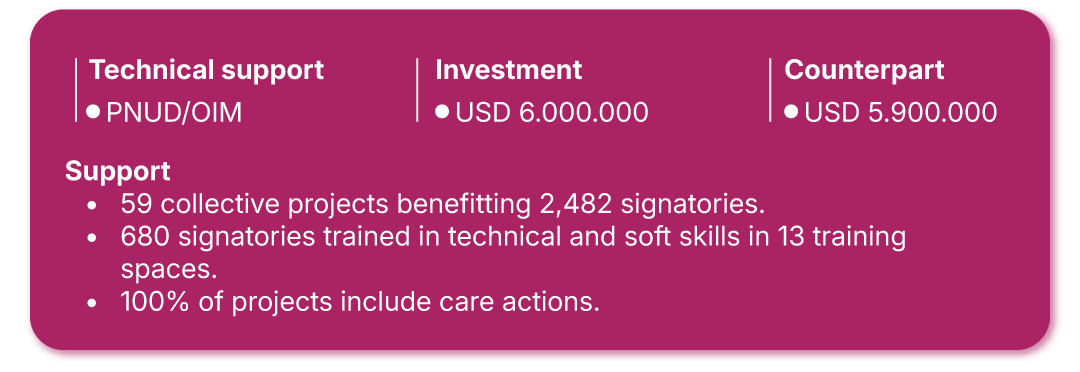
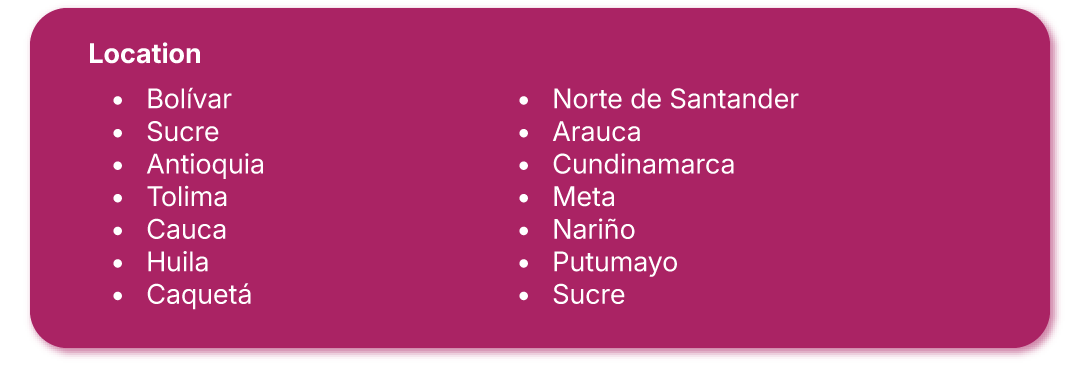
Phase III
SustainabilityConsolidation of collective production projects that contribute to the life plan of the signatory population and become a source of income in the medium and long term.
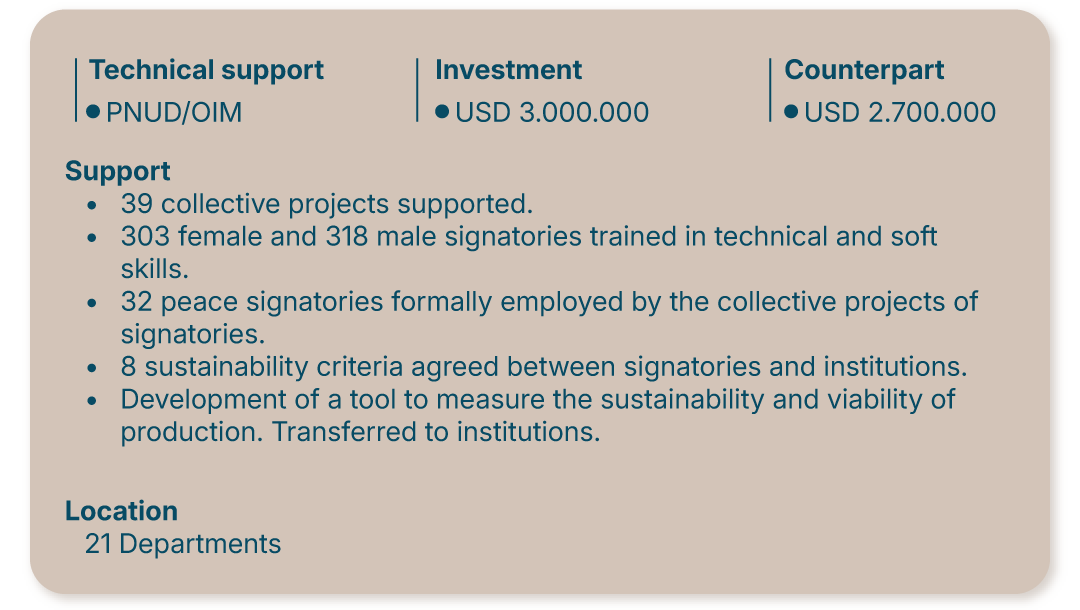

Types of projectsilvopastoral agricultural production.
Medicinal allotments.
Community stores.
Services
Community restaurants.
Care spaces
Promotion of art and culture.
Promotion of art and culture.
Food systems: coffee, sheep, sugar cane, pig farming, poultry farming, cacao, and productive systems of vegetables and subsistence crops for self-consumption.
Beekeeping.
Clothing.
Plantain.
Sacha Inchi.
Production and sale of beverages.
Yam.
Fish farming.
Pineapple.
Cattle..
Boots.
Ecotourism
Motorcycle mechanics.
Productive villages.
Coconut.
Cacao.
Tomato.
Supermarkets.
Oyster mushrooms
![]() All projects supported by the Fund promote environmental sustainability through: mitigation of environmental impact with reforestation days, enclosure with living fences, clean soil management through organic fertilizers and the establishment of terraces, installation of weather stations for planning planting stages, Environmental Management plans with regulatory inclusion of GAP and GMP, checking good practices, strengthening industrial safety, waste disposal, management, and recycling, applying the Methodology for Environmental Impact Assessment and Monitoring, Sustainability, and Natural Resource Management, awareness-raising activities on the care and protection of ecosystem assets found around production systems, certification in green markets, and coordination with entities such as Regional Autonomous Corporations to include projects in the production lines of solid fertilizers and reforestation of native trees.
All projects supported by the Fund promote environmental sustainability through: mitigation of environmental impact with reforestation days, enclosure with living fences, clean soil management through organic fertilizers and the establishment of terraces, installation of weather stations for planning planting stages, Environmental Management plans with regulatory inclusion of GAP and GMP, checking good practices, strengthening industrial safety, waste disposal, management, and recycling, applying the Methodology for Environmental Impact Assessment and Monitoring, Sustainability, and Natural Resource Management, awareness-raising activities on the care and protection of ecosystem assets found around production systems, certification in green markets, and coordination with entities such as Regional Autonomous Corporations to include projects in the production lines of solid fertilizers and reforestation of native trees.
2024 was a key year for bringing this joint strategy to a close and handing over to the Agency for Reintegration and
Normalisation (ARN) the good practices and lessons learnt from the entire process supported by the Fund. This will serve not only to continue working with these production projects but also as a foundation for other reintegration processes around the world.
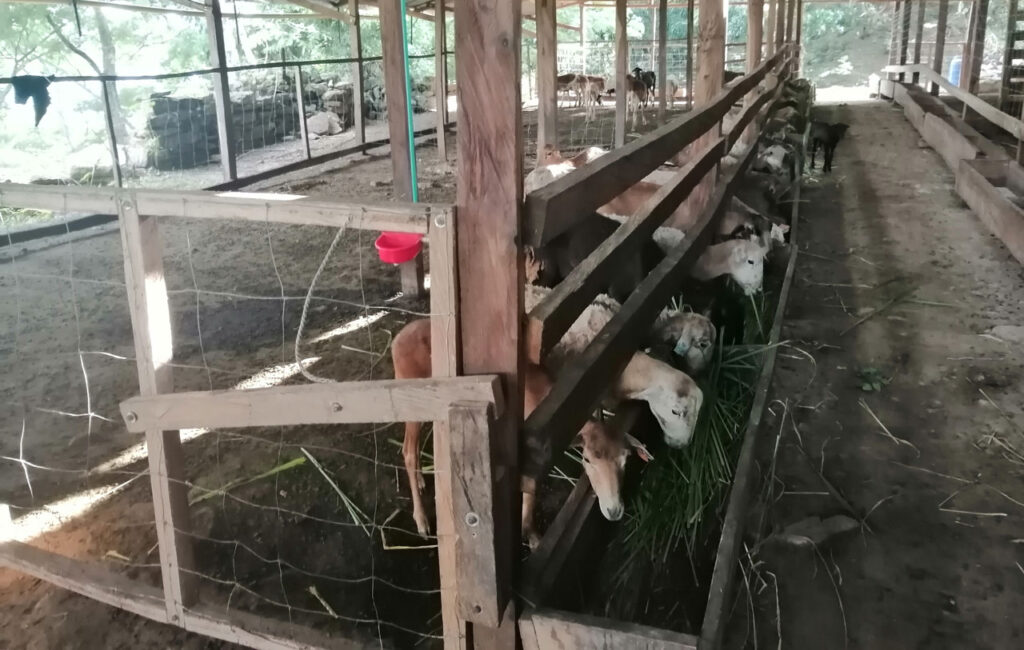
The Fund’s legacy is more than a portfolio of over one hundred collective projects in operation, at various stages of sustainability, and the training, capacity-building, and certification of skills for more than 9,000 peace signatories, it is also the transfer of capacities to state institutions so that they can subsequently take on the role of providing support, technical assistance, and financial investment to sustain these initiatives over time. It also contributed to market access and the development of commercial channels. Moreover, it laid the foundations for what is now the state’s “Economic Sustainability Strategy” for the socio-economic reintegration of peace signatories, which was formalised through Resolution 1369 of 2024. [2] [3]
It is worth noting that, thanks to the influence of the Multi-Partner Fund, efforts were made to ensure that the parties not only reached consensus on what sustainability means for these production initiatives but also that, around the eight criteria that define it, a strategic review and plan were developed and are now being implemented. This aims to enable each of these ventures to generate income and remain sustainable over time, despite the difficult conditions and contexts in which many of them operate.
[2] Ver Cartilla de estrategia de sostenibilidad e ARN en: https://www.reincorporacion.gov.co/es/Documents/cartilla-estrategia-sostenibilidad.pdf Y manual de la estrategia en https://www.reincorporacion.gov.co/es/agencia/Documentos%20de%20Siger/Documentos%20por%20Proceso/6.%20Implementaci%C3%B3n/2.%20Manuales/IR-M-10%20Manual_Estrategia_Sostenibilidad_V1.pdf
[3] Resolución www.reincorporacion.gov.co/es/agencia/Documentos%20Resoluciones/Resolucion%201369%20de%202024%20Estrategia%20Sostenibilidad%20Diario%20Oficial.pdf
Interviews with parties (ARN, signatories, IOM, UNDP and Verification Mission) involved in the socio-economic reintegration strategy, with the Fund’s contribution playing a vital role in peace signatories not only being involved in the process but also having opportunities to start a new life while contributing to reconciliation with surrounding communities.




